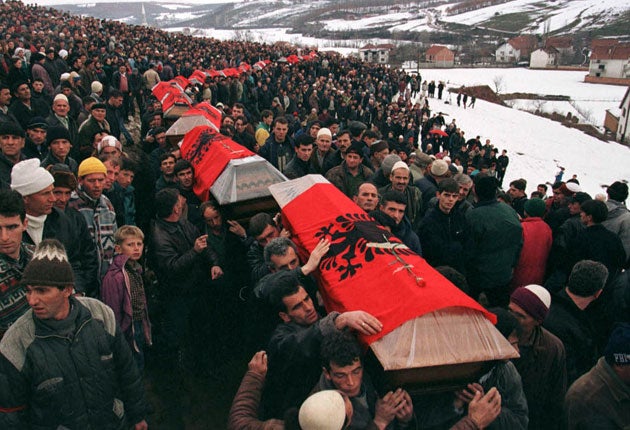Kosovo to hold first talks with Serbia since independence

Kosovo will tomorrow hold its first face-to-face talks with Serbia since declaring independence three years ago after insurgency and ethnic cleansing left 10,000 people dead and drove hundreds of thousands from their homes.
The meeting in Brussels between senior officials will include discussions on the fate of 1,800 people still missing from the 1998-99 conflict and other complex humanitarian issues.
Serbia has said that it will never recognise the independence of Kosovo but observers see the meeting as an opportunity for reconciliation despite obvious tensions that remain between Albanians and Serbs.
The two sides agreed to the EU-sponsored talks last year to improve the lives of all those in Kosovo – two million ethnic Albanians and a tiny Serb minority – where unemployment stands at 50 per cent and many people are living in grinding poverty.
"We joined this process not to play a game of poker where one side will win and the other will lose, but to solve the problems of people," said Belgrade negotiator Borko Stefanovic.
But he added his team would not cross the "clearly defined" lines regarding Serbia's refusal to accept Kosovo's independence.
Serbia goes into the talks hoping to improve its international image, scarred by atrocities committed during the conflict in Kosovo when Serbia was run by Slobodan Milosevic, who died in 2006 while on trial for war crimes at The Hague.
Serbia has come under heavy pressure from the EU to enter negotiations with the former province that Serbia claims as the historic birthplace of the Serb people.
Serbia still refuses to allow any exports from Kosovo to pass through its territory and its stance has infuriated the EU as Serbia seeks to join the 27-nation bloc. Serbia is also under pressure because of its failure to arrest the most wanted war criminal, General Ratko Mladic.
Financial pressures are more pressing for Kosovo where hardship is causing concerns about rising criminality and dependence on the drugs trade for men unable to find work.
"We're ready to enter the talks in a positive spirit and show creativity, without going into the issues of independence, sovereignty and territorial integrity," said Kosovo's negotiator Edita Tahiri, who was in Washington for talks with the Obama administration. "There is enough space between our red lines and the red lines of the other side." Both the EU and the US are firmly behind the talks. The US was the driving force behind the creation of Kosovo which was steadfastly opposed by Serbia's ally, Russia. Kosovo is, however, now officially recognised by 75 other nations.
Details of the talks agenda have not emerged but the two-day meeting is likely to deal with the issue of the 1,821 missing people from the war – 1,299 of them ethnic Albanians and 522 Kosovo Serbs, most of them civilians.
Their fate is unknown since the time of Milosevic's drive to repress the rebellious ethnic Albanians and their Kosovo Liberation Army (KLA) in 1998 and particularly 1999, when Nato launched air strikes against Serbia. The attacks were launched to try to end the ethnic cleansing by the Milosevic regime in what was known as the world's first humanitarian war.
The bombing forced the withdrawal of Serb security forces from Kosovo in June 1999, with members of the KLA – described as a "terrorist group" by the Serbs – targeting Kosovo Serbs in reprisal attacks during the chaos.
The talks come at a time of weakness for Kosovo's leadership after a report by the Council of Europe cited current Prime Minister Hashim Thaci as heading a group of rebel fighters who were involved in organised crime and organ trafficking. The organs, according to the report by investigator Dick Marty, were allegedly harvested from captured Serbs and other nationals in the aftermath of the Nato air campaign. Victims were taken to a village in neighbouring Albania where they were killed, according to the report. Mr Thaci, who was known as the KLA leader "Snake", has strongly denied the allegations, but the Council of Europe has called for an international investigation.
Other issues likely to be discussed include living conditions for the small Serb minority of fewer than 100,000 people living in Kosovo.
Subscribe to Independent Premium to bookmark this article
Want to bookmark your favourite articles and stories to read or reference later? Start your Independent Premium subscription today.

Join our commenting forum
Join thought-provoking conversations, follow other Independent readers and see their replies